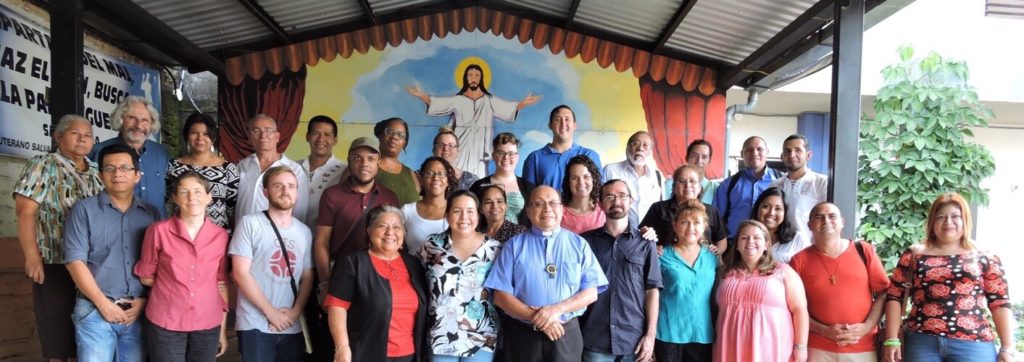Seminarians in El Salvador
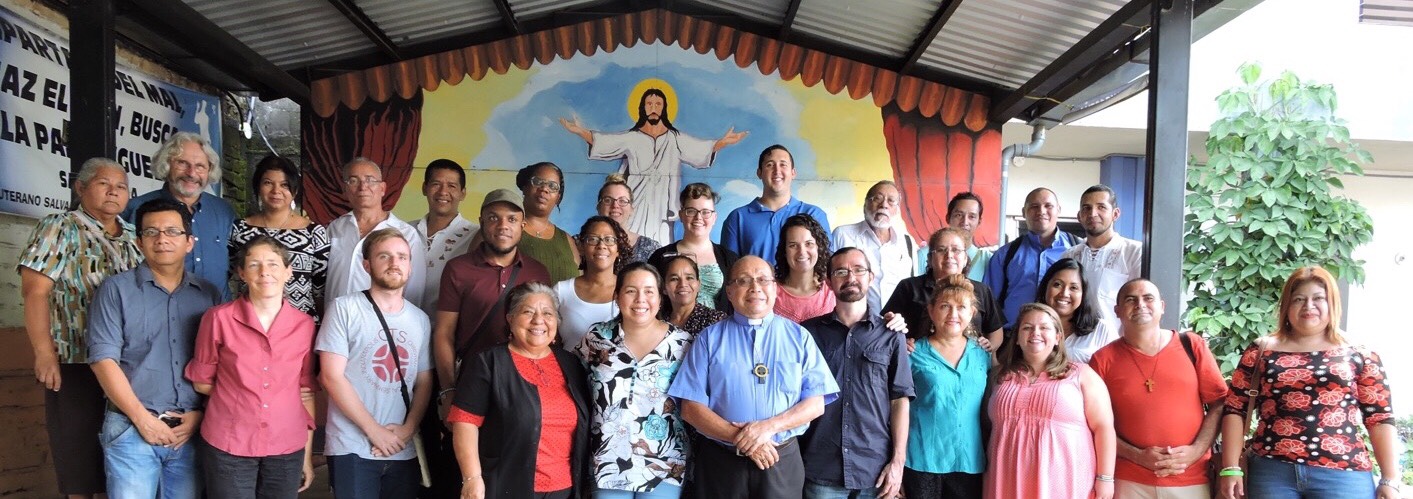
The Discipleship Project Cohort 4 at Christian Theological Seminary in Indianapolis embarked on a People-to-People Pilgrimage with the Lutheran Church of El Salvador, a Global Ministries’ partner serving and advocating on behalf of the most vulnerable. Their hope was to also walk in the footsteps and legacy of Archbishop Oscar A. Romero and to share reflections on their experience.
The First Full Day
The city of San Salvador is hemmed in by spectacular mountains, many of which reach up grandly piercing the clouds. In the same way, the people of El Salvador have been hemmed in by decades of civil conflict, oppressive Governments, poverty (many of which supported by the USA), and by the heritage of colonialism.
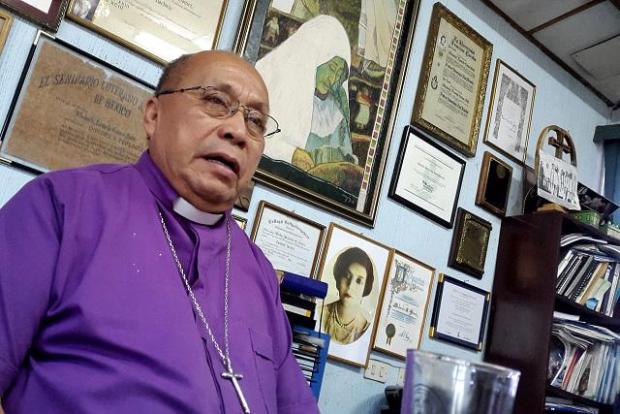 And yet our group sees the work of God being carried out in this city. Our day started with a chance to worship with a Lutheran Congregation. The Bishop led worship, a man for whom Oscar Romero was his pastor as a child and into adulthood. The church welcomed us with open arms and we witnessed the story of the church’s cross. When the government was cracking down on the Church because of its fight for social justice, the people of the community wrote down on a large concrete cross the sins of El Salvador, for whom this congregation was seeking forgiveness.
And yet our group sees the work of God being carried out in this city. Our day started with a chance to worship with a Lutheran Congregation. The Bishop led worship, a man for whom Oscar Romero was his pastor as a child and into adulthood. The church welcomed us with open arms and we witnessed the story of the church’s cross. When the government was cracking down on the Church because of its fight for social justice, the people of the community wrote down on a large concrete cross the sins of El Salvador, for whom this congregation was seeking forgiveness.
The government literally threw this cross in prison! However, the church persisted. After congregants and clergy were thrown in jail, tortured, beaten and persecuted the government eventually released the cross.
We walked further in Romero’s footsteps when we saw the church Romero was assassinated in. We saw another Cathedral whose twelve stations of the cross were sculpted from the melted down guns of the civil war. These were powerful symbols of a people redeeming violence into salvation and prophetic resistance.
Alex
Standing on Holy Ground
Today we visited two sacred spaces here in San Salvador. The first was the Hospital where Archbishop Oscar A. Romero lived, worked, and was assassinated. From the moment our feet hit the brick paved road we experienced a unique feeling. Indescribable grace, peace, and Holiness permeated the air, making me wish that I could bottle it and take it home for the frequent times where that feeling was not present. As we walked through the open doors of the chapel I was hit with the acute awareness that this space, this air, this view was part of the last experience of a man who was deeply devoted to social justice.
After spending time in the chapel learning about the struggle in the land for social justice and about the role of men and women like Romero, we were lucky enough to visit his residence there at the Hospital. This place meant so much to Romero, and even though he could have chosen to live anywhere, he chose the hospital. We learned that his heart and internal organs are buried in his front garden. His heart will always be with those in this community.
We got to view the space inside as well which included three small rooms. In one of them where the articles of clothing which Romero was wearing when he was struck by the bullet which killed him.
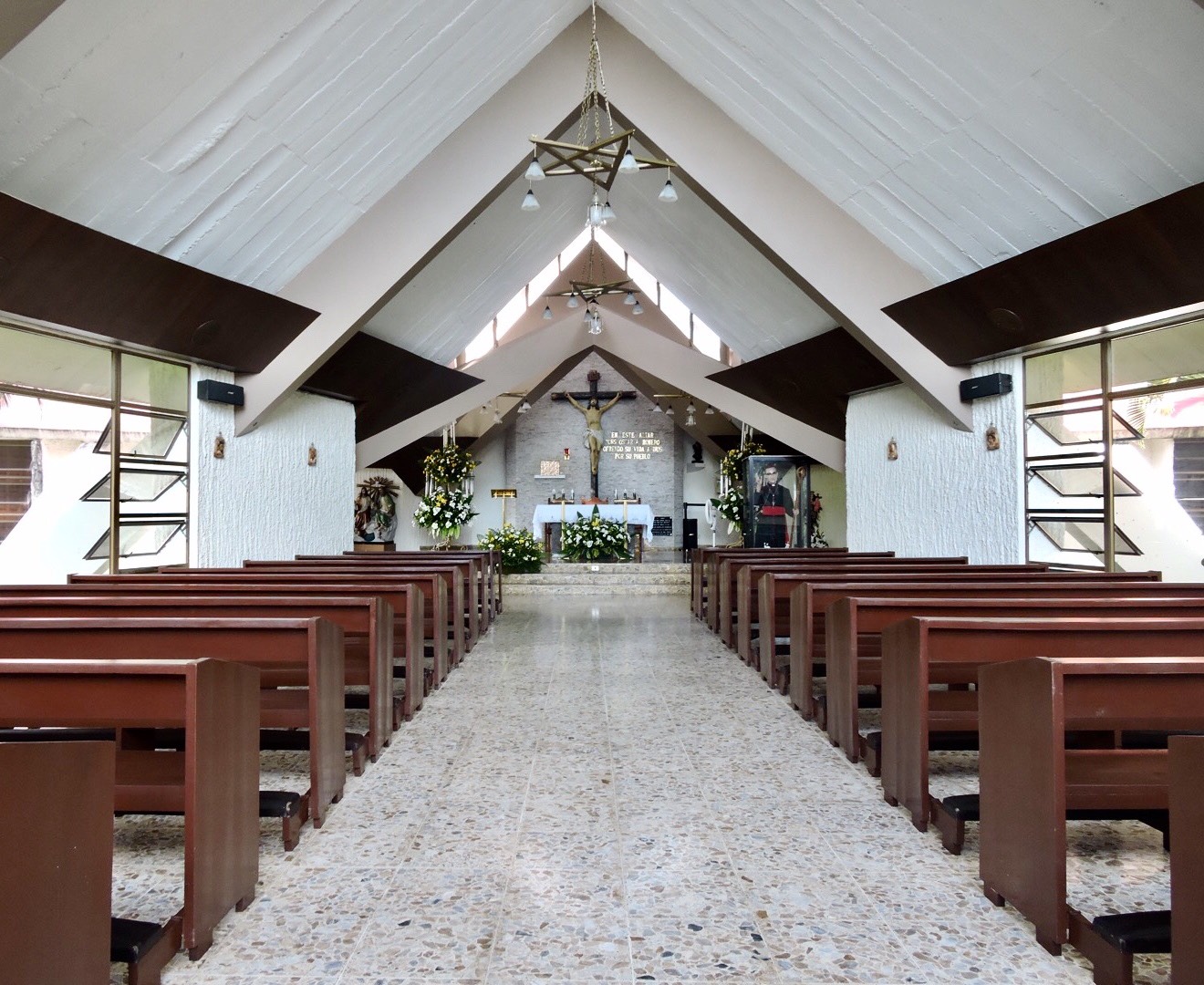 A fellow seminarian wrote this poem while we were in this space:
A fellow seminarian wrote this poem while we were in this space:
“There were two crucifixes on the alter that day,
One old and one new,
One wood and one lead.
Jesus never said,
“You get comfy while I do the work.”
He said, “Take up your cross and follow me.”
The second place that we visited was the University where the seminarians who have partnered to help us on our trip study. Within this community is where six Jesuit priests along with a mother and daughter were brutally murdered in 1989. The violence in which this act was committed is completely indescribable and brought me and fellow students to tears as we viewed graphic photos of the investigation which happened after. This investigation was raised because the perpetrators of this act tried to stage the scene and alter the narrative to fit their agenda, stating that these people attacked them and there was reciprocated violence-none of which held even a single grain of truth.
In those places I kept hearing the words of Exodus 3 when Moses encounters the burning bush and tells God he must turn away. God responds to him by saying “Come no closer! Remove your sandals from your feet, for the place on which you are standing is holy ground” (Exod. 3:4). There were many times today when I felt that scripture. I removed my shoes and placed my feet against the ground where we were because it was truly holy. The heaviness of this experience wrapped itself around my heart, and as we gathered as a group at the end of the day, we concluded our time by holding hands and singing “We Are Standing on Holy Ground”. We will spend considerable time in our lives outside of the country reflecting and processing the images, stories, and emotions that came with today but we are all in agreement that the ground on which we stood was Holy Ground indeed.
Rachel
Our Third Day
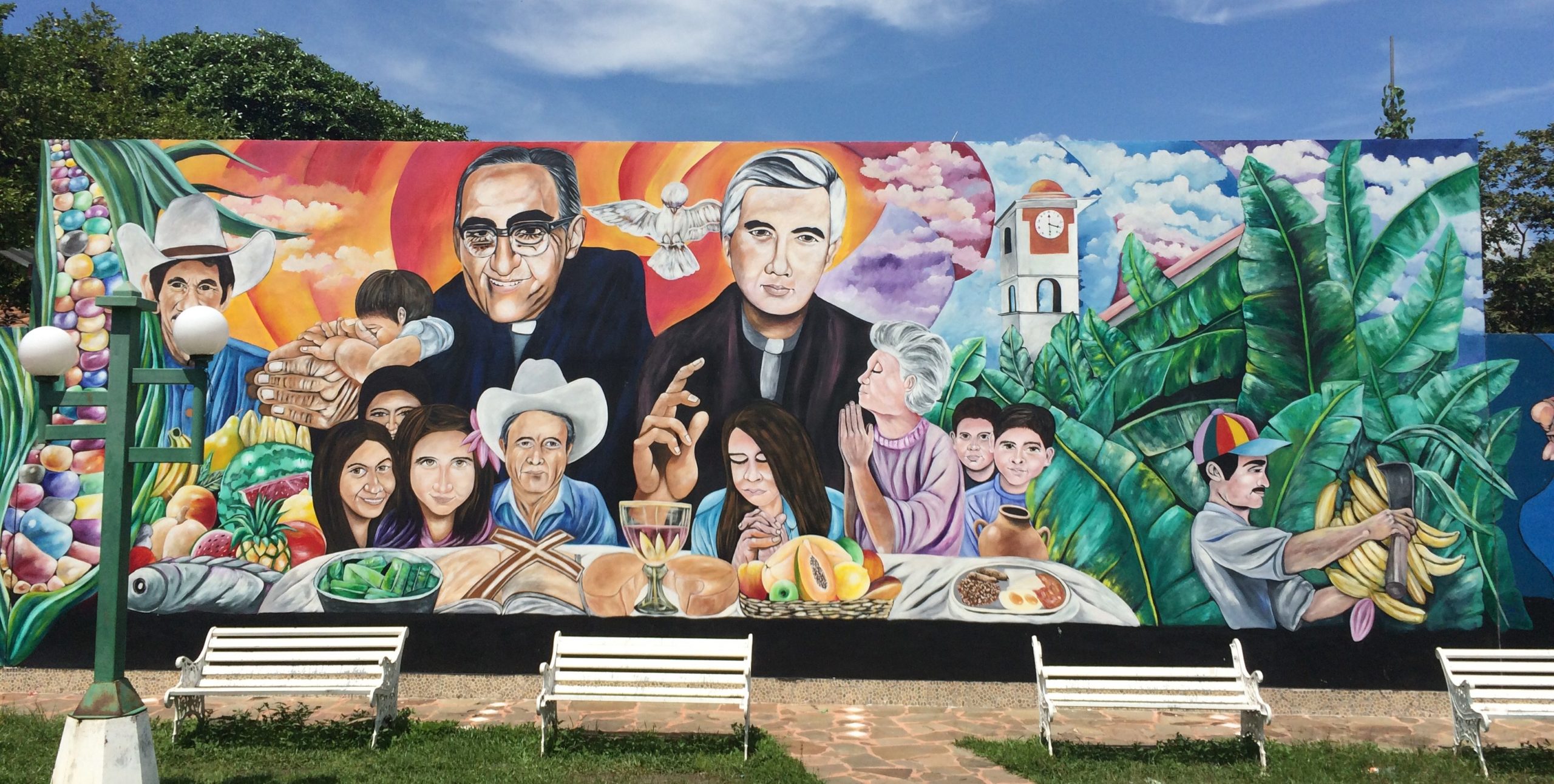
started our third full day in San Salvador by meeting with the Lutheran Synod- the National El Salvador Lutheran Pastoral Team. We learned about the good work their teams are doing in the following areas: immigration, education & evangelization, health promotion, family life, and pastoral care. It was inspiring to hear how they are working to empower others through their ministry of accompaniment. Their work provides hope that individuals will not be dependent on abusive systems, rather individuals and communities will blossom.
We also had the opportunity to meet with IPAZ, which is an ecumenical group throughout the country of El Salvador that works toward peace. We heard stories from people who have loved ones imprisoned in terrible conditions. Prisoners in this country are no longer allowed to have visitors. Bishop Medardo Gomez said, “It’s easier to make war, not peace”. It was truly an honor to see an ecumenical group, just like our ecumenical group from CTS, working together for peace.
The final part of the day was spent hiking up a dormant volcano, shopping at local venues, exploring a cathedral in the process of renovation, and eating pupusas! Now off to a night of rest so our group can be present to the good people of El Salvador tomorrow. Buenas noches!
Preston
El Paisnal and Rutillio Grande
The joy of community, the joy of dance and the joy of the ancient heritage of the Maya permeated our fourth day in El Salvador. We began in El Paisnal, following the ministry of Padre Rutilio Grande. The local Lutheran Church welcomed us with open arms as we heard the story of their joyful ministry in that community. They offer training to community members in need to start their own farm or small business. Two inspiring young women were trained in hair dressing and they showed their skills with a lively demonstration on a willing local seminarian. Joy filled the room again when we experienced the dancing and singing ministry of the youth.
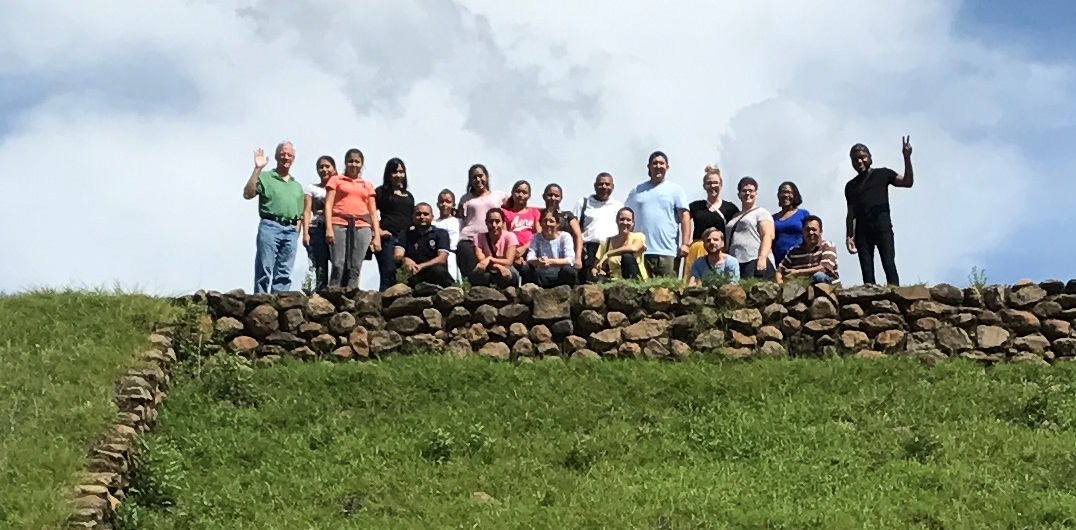 We walked into the doors of Padre Rutilio Grande’s Catholic Parish. Padre Rutilio was a major influence on the theology of Romero. It was his ministry and death which confirmed, and some say, even converted Romero to speak up for the poor in his ministry.
We walked into the doors of Padre Rutilio Grande’s Catholic Parish. Padre Rutilio was a major influence on the theology of Romero. It was his ministry and death which confirmed, and some say, even converted Romero to speak up for the poor in his ministry.
With our new friends from the hair salon and the dancing ministry, the joy of fellowship carried on to our visit to Mayan ruins. Centuries ago thousands of Mayans worshipped at a giant pyramid which we were permitted to walk onto. We saw the court were ancient athletes competed in a game reminiscent of basketball. We ended the day with the joy of a birthday with a piñata and cake provided by our generous hosts. Today our hearts were uplifted.
Alex
A Day of Unexpected Adventures
Today, as Dr. Ron Allen has christened it, was a day of unexpected adventures. We began today expecting to explore two more Mayan ruin sites. However, we arrived at the first site only to discover that the Ministry of Tourism is on strike until their union can bargain for a better salary for its workers. Because of the strike, both Mayan ruin sites (as well as several other tourist stops throughout the country) are closed to the public. Although some of us were disappointed to not be able to see more of these ancient historical sites, we were also excited to see unions fighting for the rights of laborers, as, in the United States, policies have restricted the ability of workers to unionize, and unions that do exist are restricted in their power to effect change and justice for workers.
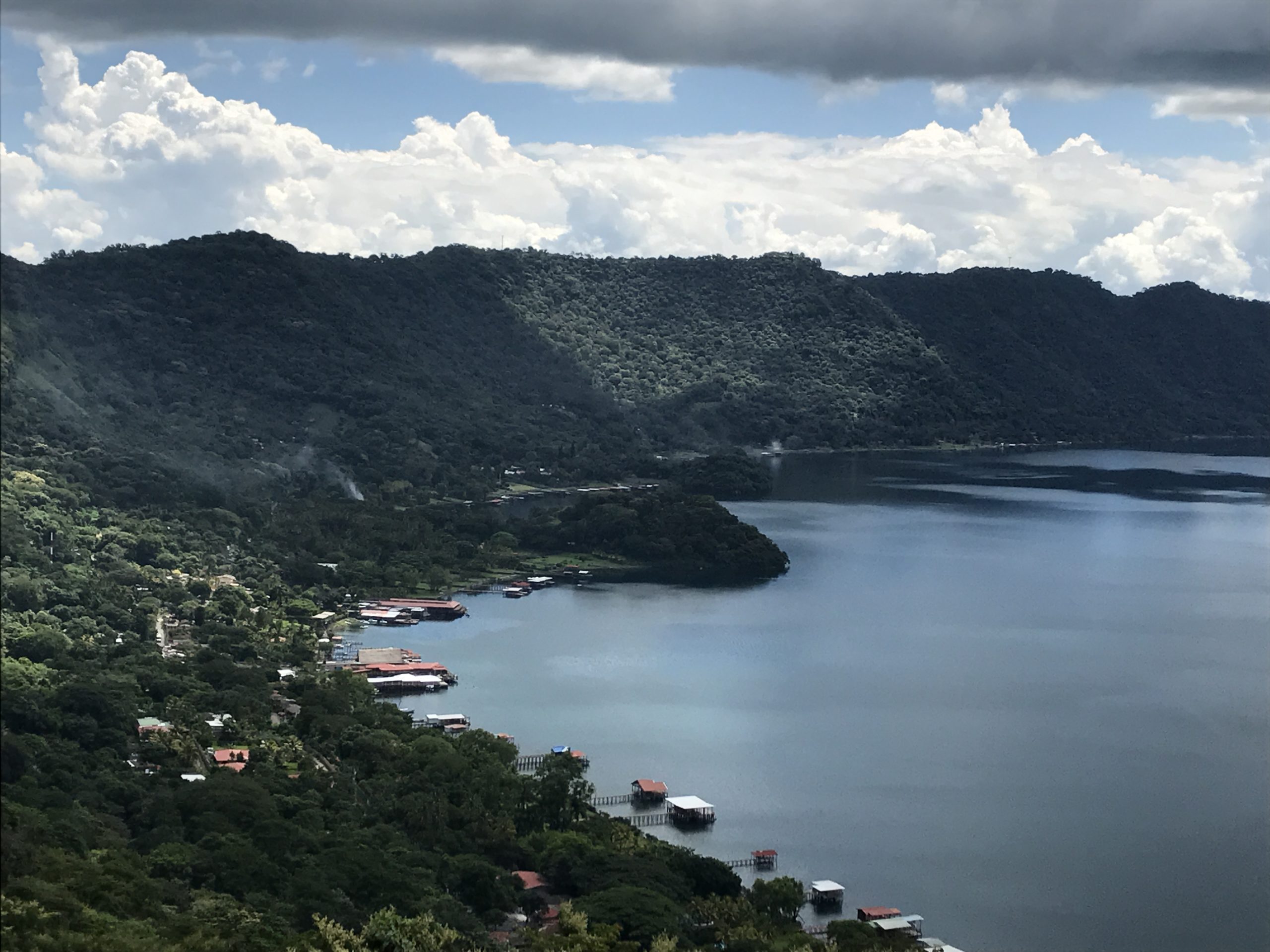 Rather than visiting these sites, we went along to Santa Ana, another large city. There, we explored Catholic cathedral, also named Santa Ana. Several of us chose to climb the bell tower of the church all the way up to the roof. From there, we could see all of Santa Ana, as well as the mountains which surround the city in every direction. It was beautiful and breathtaking. And I mean breathtaking in a literal sense. We had to climb up 8 flights of stairs to get there!
Rather than visiting these sites, we went along to Santa Ana, another large city. There, we explored Catholic cathedral, also named Santa Ana. Several of us chose to climb the bell tower of the church all the way up to the roof. From there, we could see all of Santa Ana, as well as the mountains which surround the city in every direction. It was beautiful and breathtaking. And I mean breathtaking in a literal sense. We had to climb up 8 flights of stairs to get there!
After exploring the cathedral, we continued on to Lago Coatepeque. This lake was formed inside of a crater left behind after a volcanic eruption. This crater is surrounded by three other volcanoes. We ate lunch at a restaurant built onto a dock over the lake. From our vantage point, we could see the entire lake. We got a chance to relax, to eat, to bask in the sun and the wind coming off of the lake. After lunch, several of our cohort members took a swim in the lake, becoming, as they would have us call them, the Brothers of Crater Lake. After relaxing by the lake for a while, we returned back to our hostel, to spend the rest of the evening in fellowship with one another, watching the rain fall, and listening to the sounds of the city.
Leah
A Personal Note
Yesterday, I was beginning to feel sick and overnight it got much worse. Today our mission partners here in El Salvador took me to a clinic that was closed and then to the Emergency Room. I was very dehydrated and so they gave me an IV. Our partners graciously paid for the medical services even as I asked to go to an ATM to get money. They truly showed Christ’s love, compassion, and care in a way we so often do not in the United States.
For this and many other reasons I implore my fellow U.S. citizens to view all of our neighbors to the south with much more compassion than we do. The political propaganda is that these people have no value, and this is absolutely untrue. Going forward, if you did not already recognize this basic truth, think of how they treated me and remember this when our government tries to tell you these are bad people. We must be in solidarity for the rights of our neighbors both while they live here and when they come to our country. Jesus says as we care for others, so we care for Jesus. My friends and neighbors here in El Salvador modeled Jesus for me today, and I am deeply appreciative of them. They share so much more than we often do.
Amie
The Last Day in San Salvador
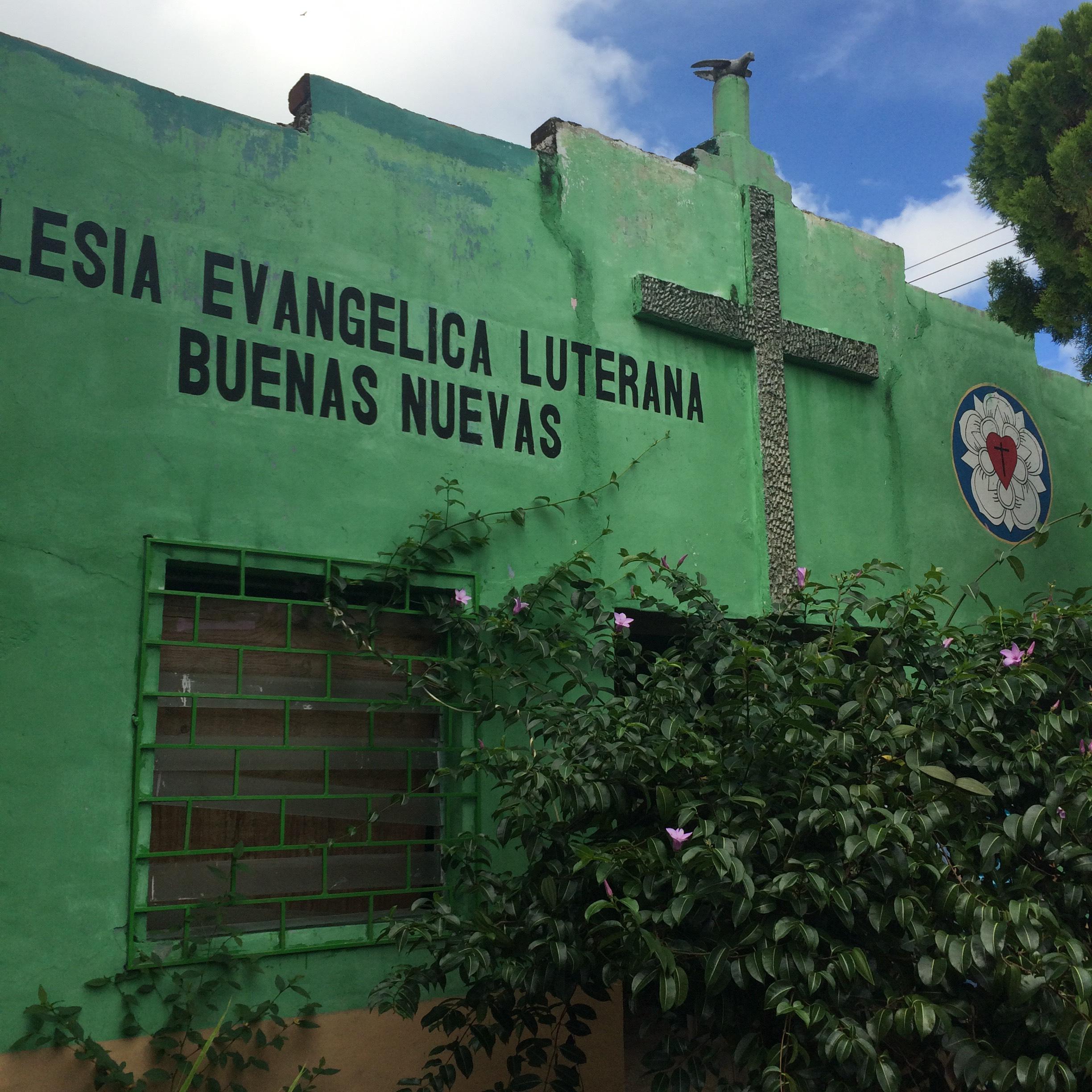 Context is so important in ministry. Today, in our final day of our pilgrimage, we spent time with the Lutheran Church of El Salvador. We learnt how the church developed its own theology best suited to its Latin American context. The Theology of Life is a system of scripturally based principles grounded in practicality with a preferential option for the poor, a theology which sees value in each human life and sees the task of theology to embrace all aspects of life holistically. We witnessed seminarians and pastors who take up this theology by responding to trauma of this country’s civil war by being trained in trauma counseling techniques. They use the Theology of Life to help people over the age of 30 to heal from the trauma by remembering someone who was killed by the civil war. What a truly contextual and holistic theology!
Context is so important in ministry. Today, in our final day of our pilgrimage, we spent time with the Lutheran Church of El Salvador. We learnt how the church developed its own theology best suited to its Latin American context. The Theology of Life is a system of scripturally based principles grounded in practicality with a preferential option for the poor, a theology which sees value in each human life and sees the task of theology to embrace all aspects of life holistically. We witnessed seminarians and pastors who take up this theology by responding to trauma of this country’s civil war by being trained in trauma counseling techniques. They use the Theology of Life to help people over the age of 30 to heal from the trauma by remembering someone who was killed by the civil war. What a truly contextual and holistic theology!
When it was time, we celebrated three more birthdays and said our goodbyes to the seminarians and the Lutheran Bishop, an inspiring church leader. We then spent time with an elected representative of the left wing FMLN party. We asked tough questions and we got a hard hitting glimpse into the political situation in El Salvador. We finished the day supporting local artists and street sellers in a night market and had a final dinner meal together sharing in the joy of remembering how this trip has impacted us. We thanked our guides and translators and exchanged our contact information so we can continue to be in solidarity with their struggle.
And, as we prepare to make the journey home, I am thankful for the holy road my fellow pilgrims and I have travelled on. We stripped away all pretenses, we saw each other truly, and we listened in divinely present ways to the stories of others.
Alex

